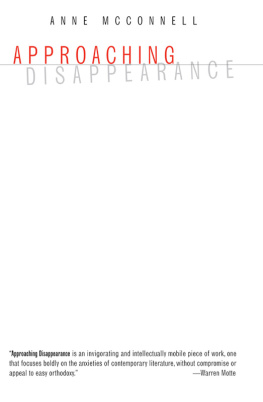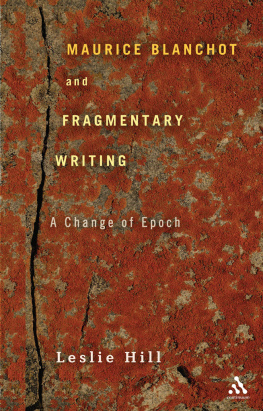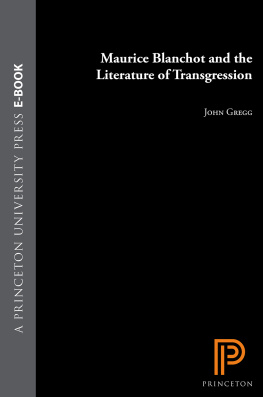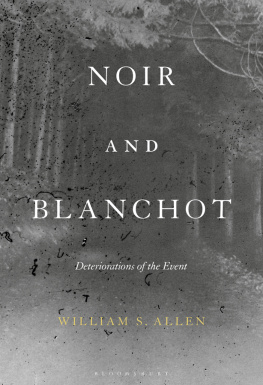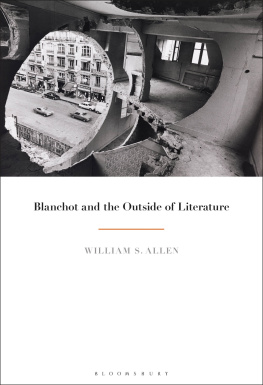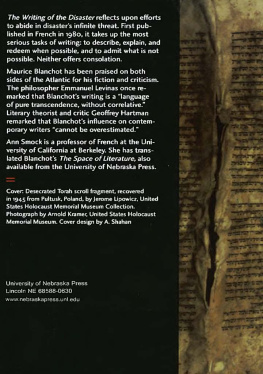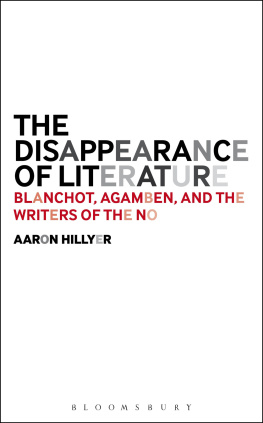
APPROACHING DISAPPEARANCE
Anne McConnell

Contents
Roland Barthes famously pronounced the death of the author in a 1967 essay where he discussed the way that writing necessarily causes the voice to disperse and to lose its origin. No longer could we think of an Author-Creator who serves as the origin of the text, its foundation, the determiner of its meaning. Of course, for Barthes, a recognition of the multiplicity and indeterminacy that arises in writing fundamentally changes the way we approach it; rather than attempting to limit a text to a single, authoritative origin, we might give ourselves over to the rich, endlessly-shifting plurality that writing offers. I mention Barthes as a means of introducing the notion of disappearance that drives my book. While my book focuses on Maurice Blanchot, one of the most significant French writers of the twentieth-century, Barthess discussion of the authors death resembles the less concrete idea of disappearance that weaves through many of Blanchots critical worksnamely, his 1955 book, The Space of Literature. Like we see in Barthess essay, the concept of an empowered author has no place in Blanchots work; on the contrary, for Blanchot, the writer necessarily disappears in the process of writing, as he or she no longer has the power to say I, to create, to make a work come into being. The writer begins writing at the point where he or she cant possibly write, where he or she disappears into an anonymous, passive space in which nothing can be done. That irresolvable paradox remains central to Blanchots thought, even if we might have difficulty pinning it down in any way. Blanchots own multiple, dispersed voice in his critical writings and his fictions provides various paths where we might trace the movement of disappearance involved in the work of literatureperhaps beginning with the writer, but also extending to the reader and to the text itself. In the first chapter of this book, I will explore the various ways that the theme of disappearance arises in Blanchots critical work, focusing on The Space of Literature in particular. In the subsequent chapters, I will provide a reading of five short fictions that reflect Blanchots notion of disappearance from distinct perspectives.
Franz Kafka serves as one of the central figures in The Space of Literature, as Blanchot finds in his life and work the struggle of solitude. By solitude, Blanchot does not mean a writers empowered decision to seclude himself or herself from the world in favor of the literary work; rather, the essential solitude characterizes the writers disappearance, or loss of self, into the impersonal space of the work. In The Space of Literature, Blanchot spends much more time grappling with Kafkas Diaries than he does with any particular story or novel. Kafkas Diaries allow Blanchot to explore the experience of writing as it is documented throughout Kafkas journalingboth in the sense that the Diaries include fragments of stories and show us something of the writing process, and in the sense that they demonstrate Kafkas inability to find a place in the world or in his work. After a discussion of Kafkas diaries, and Blanchots musings upon the diaries, I will dedicate the rest of the chapter to Kafkas narrative, The Burrow, as it tells not only a story of endless wandering, but also one of profound solitude and disappearance. The Burrow takes the reader into the pitch black, underground space where the narrator confronts not only his torturous isolation, but also the threat that he will lose himself to whatever lurks outside, on the other side of the darkness where he is sequestered. Interestingly, the first-person narrative emerges as a sort of journaling, as we read a carefully-documented account of the narrators construction of his burrow. The narrators experience, in all its darkness, paradoxically sheds light upon the risk of disappearance that he confronts, as one who responds to the demand of the work.
After considering the notion of solitude in the chapter on The Burrow, I will look to Jorge Luis Borgess The Garden of Forking Paths in order to discuss the question of infinitude as it relates to the disappearance of the literary work beyond the structures seemingly guaranteed by the material book. Borgess story plays with and challenges the possibility of structural containment, allowing the various levels and meanings of his narrative to permeate one another. Within the story, he proposes the idea of an infinite text, and the reader experiences the implications of such an idea when trying to comprehend and interpret that which always escapes beyond the limits of ones grasp. Borgess text purposefully eludes our efforts to limit it, and thus to understand it, which draws our attention to the way the text recedes beyond our vision. In the beginning of my chapter on The Garden of Forking Paths, I examine the various images of infinitude and labyrinthine space in Borgess work, as a way to approach the notion that any attempt to represent infinitude necessarily dissolves the very thing that one attempts to bring to light. Blanchot in particular takes interest in Borgess figure of the aleph, an impossible point in space that contains all space. Such figures adumbrate Borgess literary universe and take special shape in The Garden of Forking Paths. As I develop an analysis of this story, I draw particular attention to the way that Borges plays with textual structures, intricately forming them at the same time that he continually suggests the presence of that which infinitely escapes them.
Next, an analysis of des Fortss narrative The Bavard will demonstrate and develop the way that language opens a space for its own disappearance. Des Fortss narrator invites us to engage with a sort of language that fills and constitutes textual space, despite its utter emptiness. The bavardor non-stop talkersays nothing (over a span of roughly one hundred pages), dedicating his narrative only to its own perpetuation and sacrificing its possibility for constructive meaning by revealing it as a simple indulgence, a ruse. In this way, what we have read seems to disappear before us, but we are forced to ponder what remains when nothing is left. The bavards narrative functions as a sort of game, or magic trick; he actually compares himself to an illusionist, making something appear only to destroy it once we have fallen for the allure of the illusion. While the narrator identifies himself from the very beginning of the text as a bavard, and proceeds to tell us precisely about his uncontrollable illness of bavardage, the reader nevertheless becomes engaged as the seemingly privileged listener of the confessional-style narrative. We likely recognize the verbosity of narrative, at the same time that we fall into the trap of assigning it meaningdespite what we have been told. As Blanchot explains in The Space of Literature, the reader approaches the book as a stone, behind which lies the dead Lazarus; and we cant help but to call him forward, to bring death and absence into the light of day. Des Fortss narrator plays with this readerly instinct, indulging it before ultimately making himself and his narrative disappear.
One could argue that Sarrautes Tropisms seems to begin with the nothing that paradoxically emerges at the end of des Fortss textat least in the sense that Tropisms refuses to identify any single person or thing in a distinct way. The reader never has the illusion of clarity, continuity, or an accessible narrative voice, but rather immediately confronts the remarkable obscurity of the narrative. Sarrautes text abandons the I from the beginning, as well as recognizable or discernible characters, locations, or plots. In this way, he, she, it, here, there, and so on, disappear into a striking anonymity. This name-less, place-less space evokes Blanchots discussion of the neutrala space, a mode, a voice founded upon no one, nowhere. If Kafkas narratives and his journals explore the struggle of the writer who experiences his disappearance and powerlessness to constitute himself through language, Sarrautes
Next page
